Looking Back, and to the Future: the Bermuda Program at 40
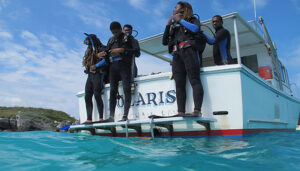
Bermuda Program intern, JD Symonds, prepares SCUBA students for their first dive.
BIOS training leads to diverse careers in marine and atmospheric sciences, and beyond
Since it’s inception forty years ago, the Bermuda Program at BIOS has provided more than 150 Bermudian college students with a paid summer internship and practical experience in marine or atmospheric research. While the program has evolved over time to meet the changing needs of students, it has always provided skillsets that open doors – not only within marine science careers, but also into careers spanning law, finance, education or human health.
Kaitlin Baird, Assistant Director of Science Education Programs at BIOS, receives piles of Bermuda Program applications every year for what has become highly competitive internship. Since Baird began running the Bermuda Program in 2010, she has placed 64 students in research and teaching experiences at BIOS. Some of these students have already been involved with BIOS for years through Ocean Academy’s suite of educational programs, getting hooked on the underwater world through the Waterstart program as young as twelve years old. Other students come to BIOS through more circuitous academic interests, but are eager to gain applied research experience. Whichever paths led them to the Bermuda Program, alumni are quick to cite the skills they developed working in labs, practicing scientific communication skills through presentations and writing, as well as scientific diving and teaching skills among the most valued aspects of their summer experience.
A springboard for science
From the beginning, the Bermuda Program catalyzed careers in science. For example, the class of 1977 included Robbie Smith, Jack Ward, and Joan Blades. Smith went on to join the BIOS (then BBSR) faculty and led a coral reef research program, while Ward went on to became director of the Department of Conservation services. Blades later served as the education officer for science at the Bermuda Department of Education.
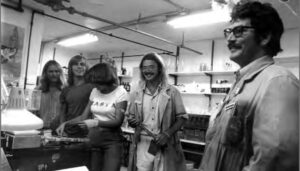
Bermuda Program interns Jack Ward, Graham Hillier, Winifred Hughes and Robbie Smith gain laboratory experience with instructor John Barnes, 1976
Bermuda Program alumni continue to be deeply engaged in research, education and outreach at BIOS today. Dr. Mark Guishard first worked at BIOS as a Bermuda Program intern in 1994, and today leads the Risk Prediction Initiative as Director of Corporate and Community Relations at BIOS.
“The Bermuda Program was my first experience of research in the practical sense, and it was hugely valuable in forming my career goals,” said Guishard. During his first Bermuda Program internship, he helped monitor the sources and concentrations of pollutants with the Air Quality Program, which consolidated his interest in the local environment and in scientific research.
Guishard continued his education at Penn State University, where he earned his Ph.D. researching Atlantic hurricanes and subtropical storms. He went on to work as a Forecaster for the Bermuda Weather Service, and subsequently served as Director from 2006-2012. In 2013 he returned to BIOS as a faculty member, and paid his experience forward by mentoring the next generation of Bermuda Program students.
Likewise, Rachel Parsons has been a member of the BIOS research team since 1994, but before that was a Bermuda Program intern in 1988 and 1989. During that time she worked on water chemistry measurements around the Bermuda platform and on the inaugural Bermuda Atlantic Time-series Study measurements. Currently, Parsons runs the microbial oceanography lab and also manages the Research Experiences for Undergraduates internship at BIOS, which provides similar research opportunities for American university students every fall.
“The Bermuda Program was an amazing opportunity for me and ensured that I continued my education in science,” said Parsons. “While I have had many experiences that brought me to my chosen field of research, it all started with the Bermuda Program at BIOS.”
A caring community
Today in Parsons’ microbial oceanography lab, the same cutting-edge techniques used to identify single cells in seawater are often used in medical research labs, and many of the students she has mentored in her career at BIOS have gone on to careers in medicine, health, and biomedical research.
During a recent hospital stay, Parsons encountered a former Bermuda Program student, Stephen Lightbourne, who was the on-call physiotherapist. “It made my day seeing him excelling in his chosen career,” Parsons said.
The Bermuda Program network continued to provide a web of support. Jecar Chapman, who had studied the molecular mechanisms behind sea urchin cancer resistance in the Bermuda Program, was interning in the hospital’s pathology lab during Parsons’ stay. While she was hospital bound, Chapman offered to visit her lab to mix up fresh reagents and ensure the current interns had everything needed to continue their research in her absence. And Meredith Bibbings, Parsons’ most recent Bermuda Program alum, took vacation time to help keep the lab running during Parsons’ recovery. The outpouring of highly skilled assistance from Bermuda Program alumni represented the cycle coming full circle in ways Parsons never expected.
Looking to the future
As the demand for this type of internship is on the rise, Baird strives to make the program accessible to as many students as possible. While funds for eight-week internships are limited, she’ll do her best to pull together even a few weeks of support if possible to maximize the number of promising students getting a taste of research in Bermuda.
“The majority of students come back for more than one summer, and they really become a part of the BIOS family,” said Baird.
Looking forward, Baird sees several opportunities for this transformational program to grow. “My hope is that with sufficient funding we can increase the number of students we serve, and continue to build the infrastructure of the program to provide even more professional development for these students.”
Recent Bermuda Program participants: where are they now?
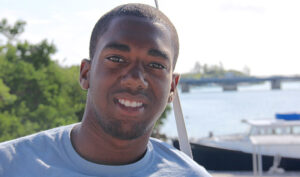
JD Symonds
Currently:
Sophomore at the University of Tampa, majoring in marine biology
Bermuda Program mentor:
JP Skinner, Director of Ocean Academy educational programs
Noteworthy skills developed in the Bermuda Program:
“Communication. Working with new groups of young teens every week and ensuring that they easily and fully understand the complexities associated with SCUBA diving is a very difficult task. Those complex ideas need to be communicated to them in such a way so that it does not scare, provides them with the necessary information, and remains engaging.”
Impact on JD’s career path:
“Although I knew I wanted a career in the marine field of study, marine is such a broad term. Prior to participating in the Bermuda program, I did not exactly know what I wanted to do post-graduation. During the internship of 2015, JP offered me the opportunity to take my SCUBA certification to the next level and become a dive master. This new certification would allow me to be more active in the teaching and certifying of new divers, as well as provide opportunities to communicate all this information I have obtained about the ocean (from past internships). During that summer it dawned upon me that becoming a SCUBA instructor meant I can share the joys of experiencing the beauty and diversity of the underwater world, and I am able to share with others how to preserve it.”
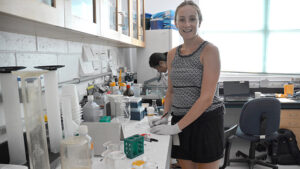
Meredith Bibbings
Currently:
Learning about clinical neuroscience research as a Research Programs Intern at the Ontario Brain Institute. Plans to apply to medical school and eventually return home to care for the Bermudian community.
Bermuda Program mentor:
Rachel Parsons, manager of the Microbial Observatory
Noteworthy skills developed in the Bermuda Program:
“The Bermuda Program allowed me to hone my scientific writing skills, while building confidence in my ability to present science to scientists. I also learned molecular biology techniques, including DNA extraction and purification, which are vitally important in many other areas of science.”
Impact on Meredith’s career path:
“Even though my science career path has not ultimately lined up with microbial oceanography, my Bermuda Program experiences have been integral to my success so far. It brought my undergraduate classes to life, and motivated me to continue my cell and molecular biology courses. Even more importantly, the Bermuda Program provided me with an unforgettable, personal experience of the research process. This has been an incredible asset in my career so far, even though it has been ‘away from the bench’.”
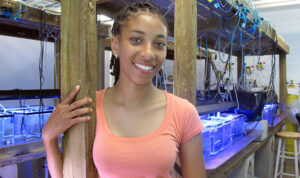
Kascia White
Currently:
Since earning her masters degree in Marine Management from Dalhousie University last December, Kascia is a fulltime Aquarist at the Bermuda Aquarium Museum and Zoo.
Bermuda Program mentor:
Dr. Samantha de Putron, coral reef ecologist
Noteworthy skills developed in the Bermuda Program:
“The Bermuda Program served as an amazing foundation to becoming a self-sufficient scientist, providing me with field research skills, presentation skills, scientific diving skills as well as experience and knowledge about the ocean and the environment. More specifically, the Bermuda Program gave me experience with conducting and managing on-going lab experiments, lecturing and talking on camera, aiding in the learning of younger marine biologists, leading dive groups for collection of scientific material, basic pilot and boat driving skills, CPR and oxygen administration certifications, dive safety skills, scientific writing skills and sense of work ethic, communication, and awareness.”
Impact on Kascia’s career path:
“Being born in Bermuda I have always loved the ocean and the organisms it contained. I began my quest towards a career in marine biology at the age of 15 when I first learned to SCUBA dive as a Waterstart camp student.
After my first summer at BIOS there was no doubt in my mind that this was my chosen career path. With that in mind, I knew I needed to be more serious about the steps I would take to achieving my goal of becoming a marine biologist. I was accepted as a Bermuda Program student under the tutelage of Dr. Samantha dePutron in the Ocean Acidification lab at BIOS, where I remained for five years. It was there that I completed my research for my undergraduate honors thesis. After my time as a Bermuda Program student I was able to work as a summer student at the Department of Conservation Services for three years followed by the Department of Environmental Protection where I conducted my Master’s thesis research. I completed a professional Master’s degree in Marine Management in December 2015.”
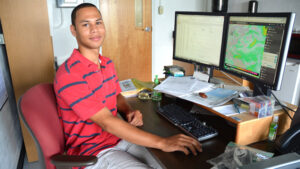
Michael Johnston
Currently:
Senior undergraduate at Penn State University, studying Meteorology with a minor in Geographic Information Sciences.
Bermuda Program mentor:
Dr. Mark Guishard, meteorologist
Noteworthy skills developed in the Bermuda Program:
“The Bermuda Program has been instrumental in developing scientific communication skills – through both oral and written presentation. This put me ahead of my peers as a freshman at Penn State, and helped me speak with confidence when giving presentations and being interviewed.”
Impact on Michael’s career path:
“Since my first involvement in the program in 2012, its biggest influence has been to show me the breadth of applications for meteorology – from climate studies that link to the health of humans and ecosystems, to military or aviation, or even to risk management and (re)insurance.
While you’re definitely learning technical skills at the Bermuda Program – you’re also creating connections to inspirational scientists, you’re getting experiential learning in not just your field but those of your peers and mentors, you’re exploring interesting new questions about the world so that everyone can better understand it. The Bermuda Program truly puts students in a better position for the road ahead.”
